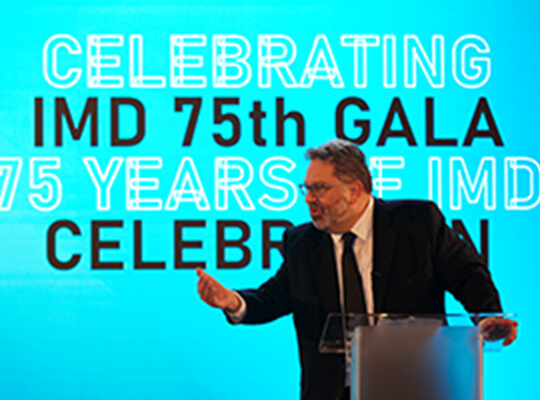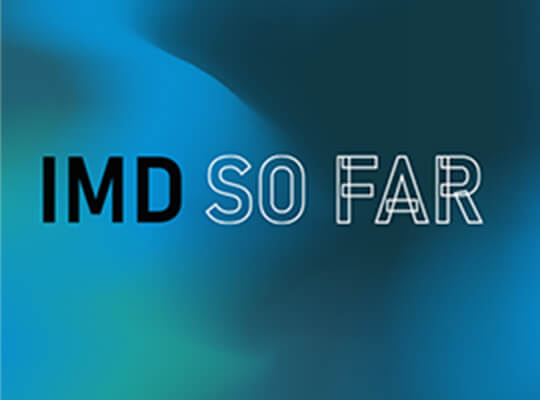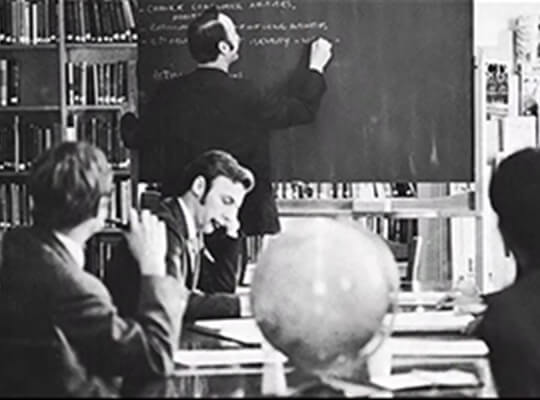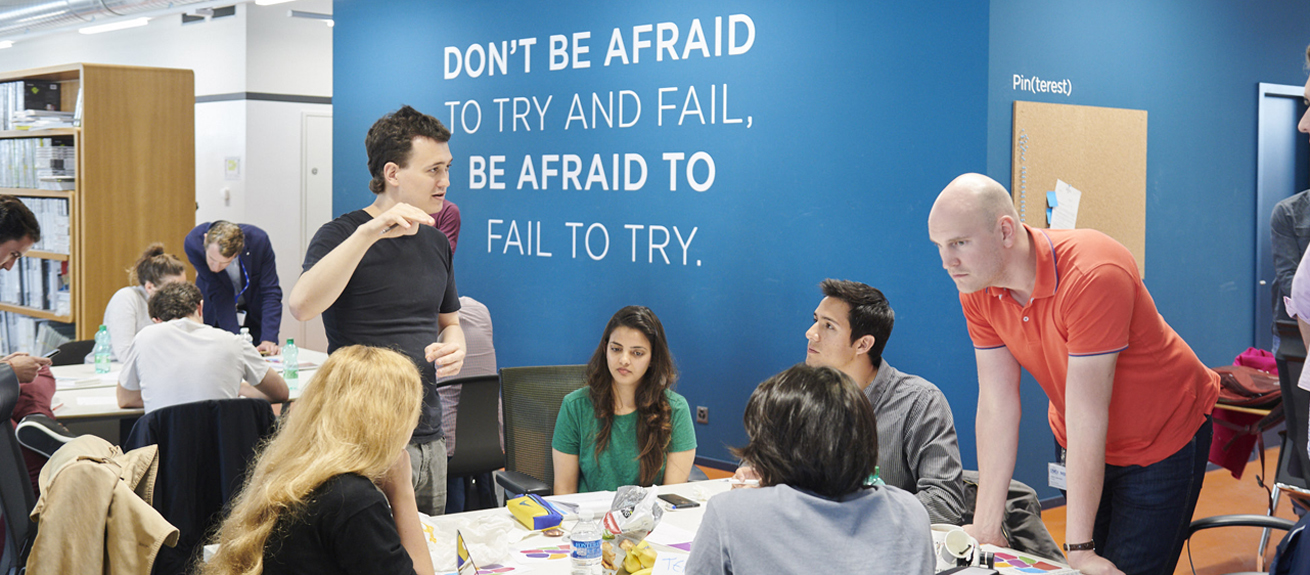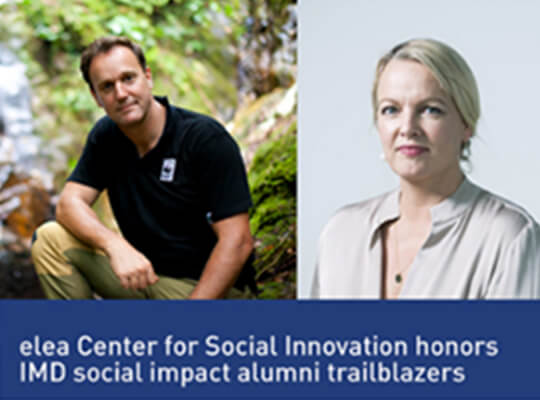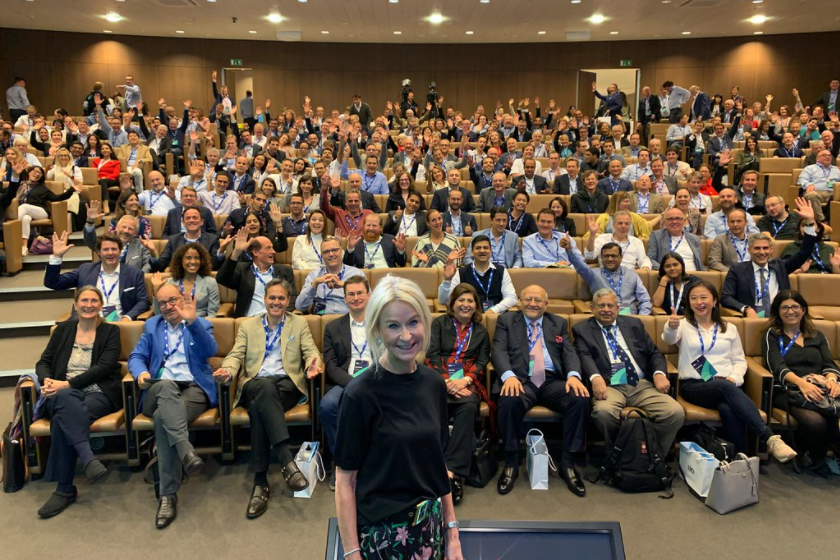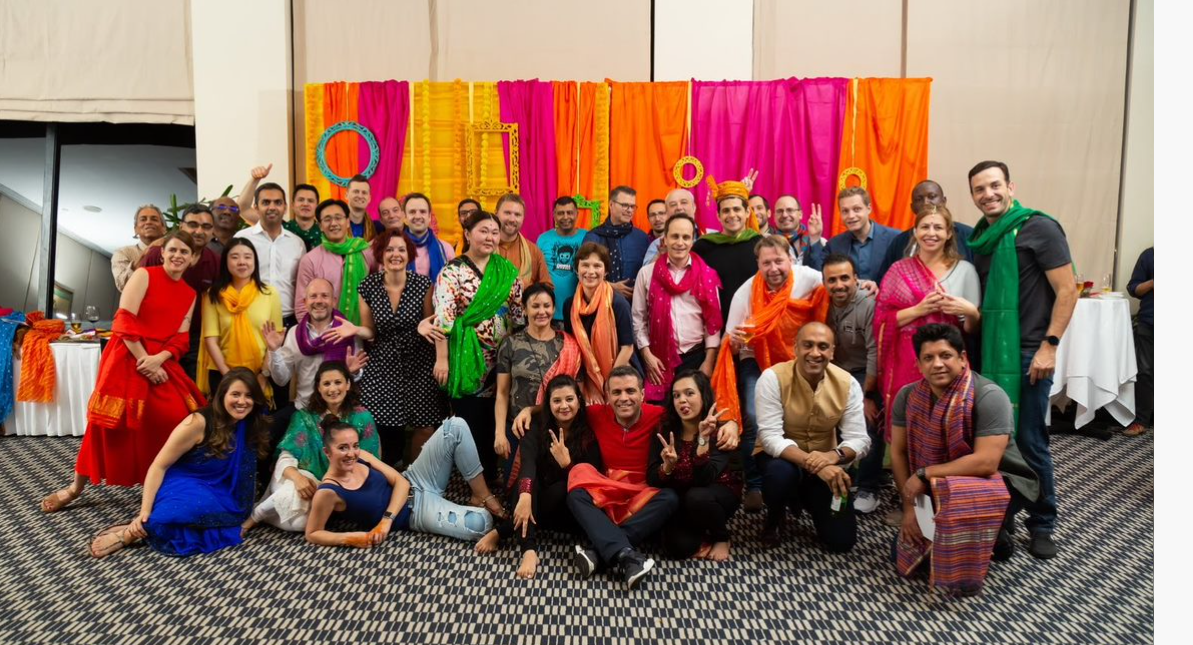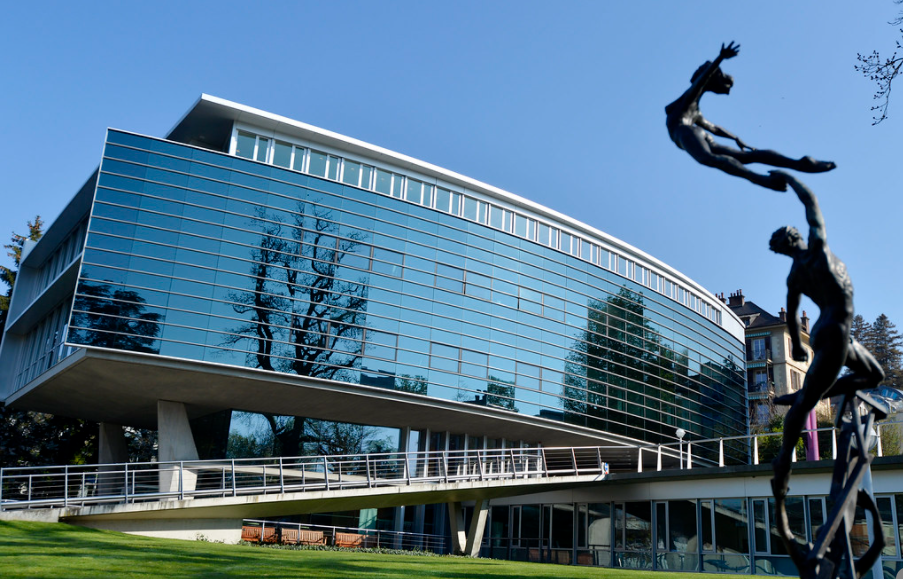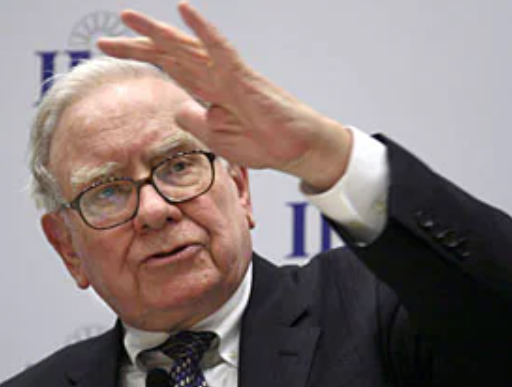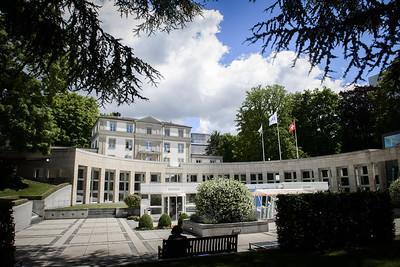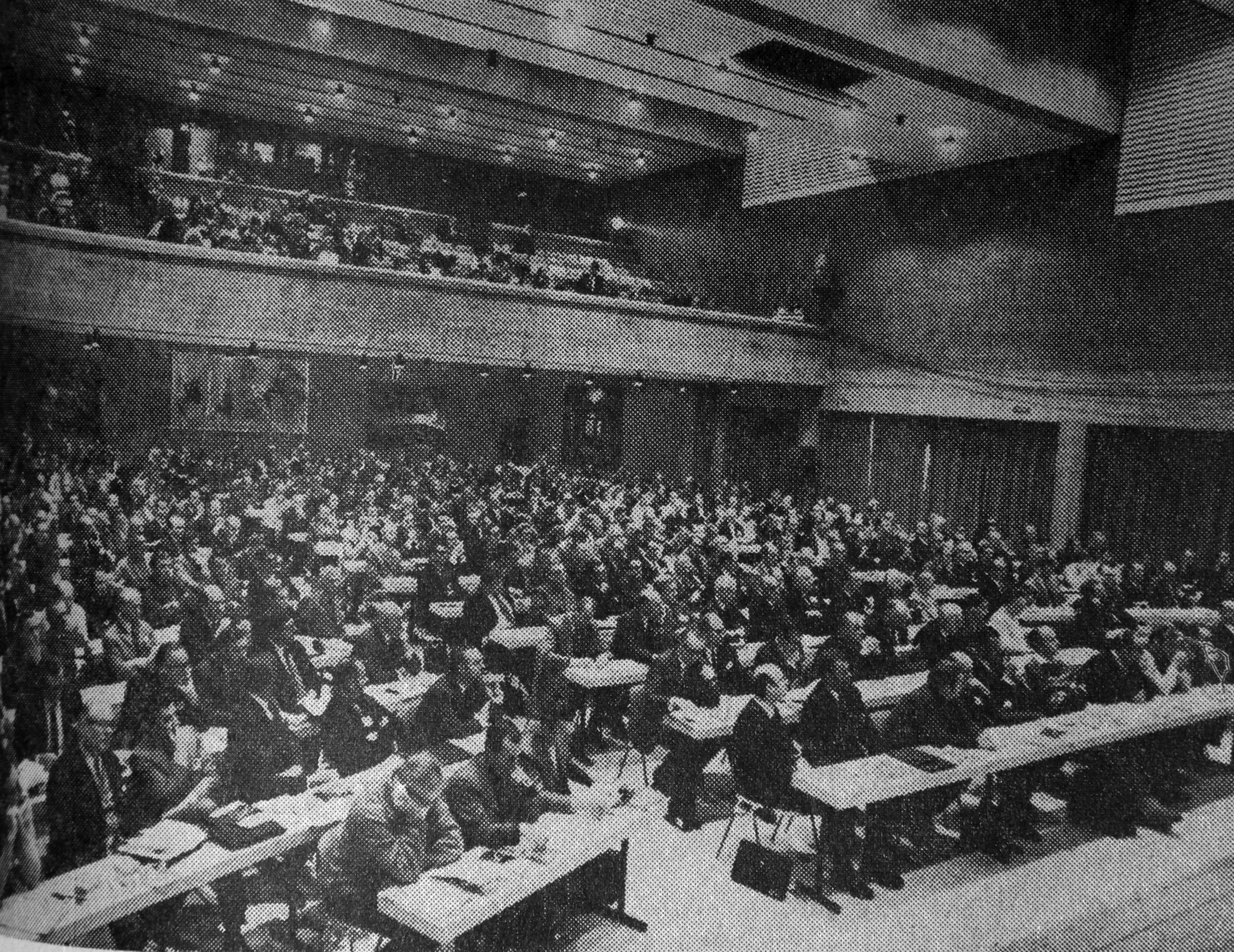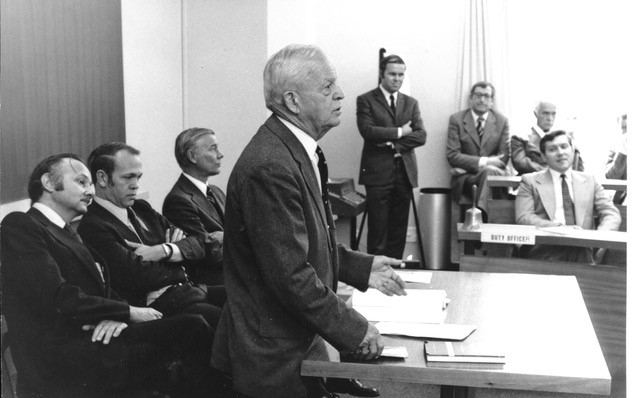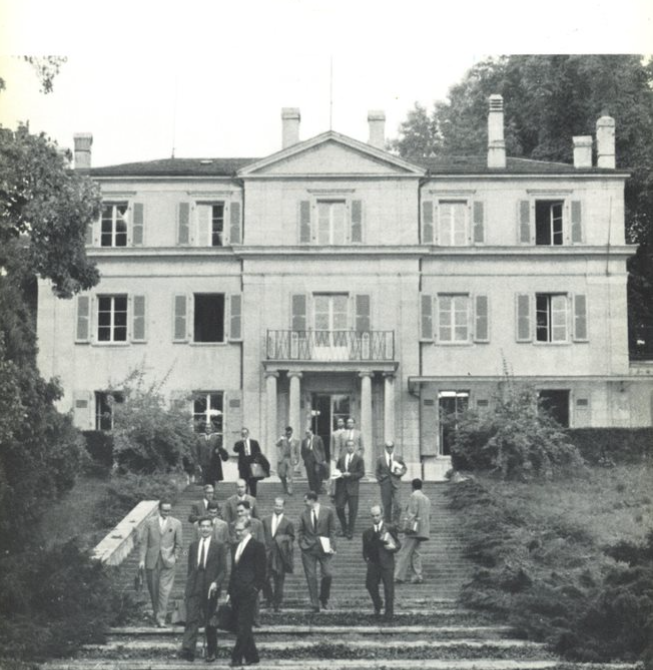



Discover more about IMD’s history – and its future

More than 75 years of tangible impact
Discover more about IMD’s history – and its future
Developing leaders who contribute to society since 1946
Discover how we have evolved into one of the world’s most influential and impactful business educators.
Discover the context, people, challenges, and choices that made IMD what it is today.
IMD celebrates the pioneers who helped transform it into one of the world’s best providers of executive education.
Since it was founded on 5 November 1946 in Geneva by Canadian aluminium producer Alcan (now Rio Tinto Alcan), IMD has shaped the lives of many leaders who have, in turn, gone on to transform organizations and society.
The pioneers who shaped IMD and its future shared a commonly held desire to create a center of excellence that would always have a global outlook, punch far above its weight, and retain the shared DNA – with CEI-IMI and IMEDE – that would make this a special place.
In the words of IMD’s President Jean-François Manzoni, “Today’s IMD faculty and staff and I, we build on the legacy of visionary and courageous individuals who innovated relentlessly over decades, and day after day built a great institution and trained a fantastic Alumni group.
“Standing on the shoulders of these giants is humbling, but it is also incredibly inspiring; from that height you get to look into the future and see how much more we can do, together, to live our purpose and contribute – in a small way, but hopefully in a very real way – to a world that generates the growth we require in a more sustainable and inclusive way.”
As IMD looks to the future, its leadership and team will continue to take inspiration from its visionary founders, living its purpose to innovate, lead, and make sense of a world defined by uncertainty and complexity.
As part of the degree curricula, IMD MBAs and EMBAs undertake projects to share expertise with and actively support the vibrant Swiss startup scene.
Since 1998, more than 400 Swiss startups have worked with MBA and EMBA participants through the IMD Startup Competition. It is open to early stage companies in Switzerland and offers the opportunity to build viable business models and pitch to Silicon Valley investors.
In a 2021 ranking of Switzerland’s top 100 startups by the website www.startup.ch, 40 of the top 100 were past IMD Startup Competition partners, with four in the top 10. Since the ranking’s creation in 2011, it has featured 438 Swiss deeptech startups, 40% of these startups have worked with IMD’s MBAs and EMBAs.
We drive innovation and enable companies to become future-ready.
Creating new solutions for products, services, markets, models, and processes to the benefit of global society by addressing social and environmental needs more efficiently and effectively than current policies and businesses. That’s social innovation in a nutshell – and it lies at the heart of the elea Center for Social Innovation.
At IMD, the work of the Center has been integrated into MBA and EMBA degree programs and inspires Alumni to make a positive impact through their careers. And since 2020, that positive impact has been recognized with an annual award.
The elea Social Impact Recognition Award highlights the work of Alumni across the full spectrum of social impact and innovation. Nominated by their peers in the MBA Alumni community, three trailblazers working in very different disciplines (from environmental conservation to the worlds of corporate finance to toymaking) received the 2021 award.
Read more about how IMD prioritizes sustainability and social innovation in Chapter 11 of IMD 75 years.
What do these numbers add up to?
It’s the IMD Alumni network of over 125,000 individuals from 140 countries and 80 industries who have formed 49 Alumni Clubs around the globe.
The network is a widespread but close-knit global community that is caring, supportive, and purposeful. Among its activities, it supports MBA scholarships, enabling talented young professionals to access one of the world’s leading programs.
Way back in the 1990s, a former US Air Force officer joined IMD to teach leadership. Jack Wood kicked off what is still an exceptional offering in today’s business education environment. He wanted leadership to be taught by “people with psychological insight, who could read the agenda on and under the table, and ask students about their feelings”. It was essentially all about slowing down, being reflective and checking in with themselves.
This therapeutic approach, offering voluntary, regular consultations with Jungian analysts, has a profound effect on many aspects of the professional and personal lives of participants. In the words of IMD graduates, the Personal Development Elective (PDE) has enabled them to reflect more clearly on their management styles and behavioral tendencies.
Those “soft skills” that have suddenly become so important were already incorporated into IMD’s MBA program more than 20 years ago.
The EMBA program at IMD includes three weeks of discovery expeditions to various parts of the world. As well as being exposed to new environments and experiences, the participants focus on explicit learning objectives. This is about learning all the time, from everything and everyone around them – not just in a classroom.
India, Silicon Valley, China, Israel, Kenya, Peru, and Vietnam are just some of the destinations for a first-hand experience of globalization.
In the words of the current EMBA Dean Stefan Michel, “It is usually the participants’ most holistic and memorable learning experience.”
To mark the institute’s 50th anniversary back in 1996, the Alumni Association of the Netherlands presented IMD with the Lifting Spirits sculpture. At that time, the Dutch Alumni formed the largest and most active group and gifted the work of art as a special thank you. By the Dutch artists Jean et Marianne Bremers, Lifting Spirits takes pride of place in the campus gardens.
Read Chapter 3 to find out more about IMD’s Bellerive home.
The historic building at the heart of IMD’s campus – known as La Résidence – has its own story to tell. Built in the 18th century, it has over time been called Le Palais, La Maison de Maître, and La Villa Bellerive.
In 1846, Charles Dickens spent five months with his wife and children in Lausanne, writing Dombey and Son and finding further inspiration for some of his best known novels. The family rented Villa Rosemont and spent much time at La Résidence visiting the owners, the Baird family, whom he had known for some years. Lausanne’s Avenue Charles Dickens is named in his honor.
But Dickens was not the building’s only illustrious visitor.
French President Adolphe Thiers, as well as Serge Diaghilev and his troupe of Russian ballet dancers, all stayed at La Résidence.
The villa became part of the IMEDE Campus, which today houses the main reception and offices for the client engagement teams.
Chapter 3 of IMD 75 years reveals more history.
When Warren Buffet visited Switzerland on May 20, 2008, there was a great deal of speculation as to the goal of his trip.
In actual fact, he was attending the 20th anniversary of Family Business Research and Education at IMD, which he marked with an open, engaging discussion.
Buffet had very good reasons to accept IMD’s invitation.
Family businesses include some of the most significant, innovative, long-lasting, and valuable enterprises in the world.
They include sector-leading businesses such as retailer Walmart, automotive giants Volkswagen and BMW, investors, holding companies, and trading firms as diverse as Berkshire Hathaway, Koch Industries, Exor, Softbank, Tata Group, and Reliance Industries, tech pioneers Dell and Oracle, and businesses as varied as Lego (toys), Roche (pharmaceuticals), IKEA (retail and design), ArcelorMittal (steel and mining), Tetra Pak (manufacturing), L’Oreal (cosmetics), Samsung (electronics), LVMH (luxury goods), and many others.
Estimates vary, but worldwide family businesses account for at least two thirds of all commercial enterprises. Their significance was recognized by IMD with the ground-breaking program Leading a Family Business, established in 1988, the launch of the IMD Global Family Business Award in 1996, and the establishment of the IMD Global Family Business Center in 2011, now widely seen as the world’s leading center of excellence.
Image Copyright: swissinfo.ch
In June 1955 in Frankfurt, West Germany, several of Nestlé’s senior international executives and leadership team met to discuss how the Group was structured, and in particular how to address problems with the performance of the sales organization. They asked a group of young men who already had responsibility in the organization to share their views on how to better prepare their colleagues for the future.
Shortly after the Frankfurt meeting, two of the senior executives present – Enrico Bignami and Jean-Constant Corthésy – travelled together on a three-day, 10,000 kilometer flight from Europe to Sydney, Australia. It was during this journey that the two men had the opportunity to reflect and discuss the brief but intensive meeting that had taken place in Frankfurt.
A few days and another 10,000 kilometers later, Bignami and Corthésy met with professors from Harvard University and, after meeting for 16 hours, the idea of creating IMEDE had taken shape.
If you’re interested in the details, they are all in Chapter 3 of IMD 75 years.
In 1946 Paul Haenni took under his wing a group of young managers from China’s Natural Resources Commission? And that was just the beginning.
In 1982, Bohdan Hawrylyshyn, the then Director of the IMI, was invited to lecture to a group of Chinese military officers in Shanghai. After the lecture, Hawrylyshyn decided to catch the bus back to his hotel so he could see a little of the city. After two stops a Chinese man boarded the bus and sat next to him. The two men fell into conversation, and the man asked Hawrylyshyn where he was from and what he did.
The IMI Director explained that he was a Professor of Management, based in Geneva, and told the man about the Chinese students studying in Switzerland with Alcan in 1946. The Chinese man went pale, his mouth opened, and his eyes widened. Then he smiled. “I did my MBA at Wharton”, he said, “And for that reason I was hired by the Natural Resources Commission to be the liaison for that group. I knew the students – and Dr Haenni – very well. They highlighted in their reports how incredibly valuable the experience was, and how it provided a broad education and perspective.”
Needless to say, Hawrylyshyn was amazed. The statistical probability of meeting someone, randomly, who knew of this event so far removed in time and place from their current location was incredible. IMD networks, connections and memories are incredibly durable.
In 1971, a celebration took place to mark the 25th anniversary of the CEI. The choice of venue, in the mountains of Switzerland, was to have great historic significance.
CEI’s 25th anniversary in 1971 was celebrated with 500 senior business leaders, company presidents, and CEOs from 32 countries attending the First European Management Symposium in Davos. The event, which took place between January 24th and February 7th, was designed to highlight CEI’s journey to a fully developed “Centre for Education in International Management”.
Interestingly, the venue was chosen because of its seclusion: senior executives were much less likely to be absent or distracted in Davos than in a commercial centre such as Geneva, New York, or London. The venue even had a nuclear bunker in the basement where sessions could take place, ideal for avoiding unwanted interruptions. The timing was also relevant; 500 executives, together with support staff, could be comfortably accommodated in a quiet resort at the end of the traditional skiing season.
Speakers included thought leaders who have a lasting place in the history of management thinking: Igor Ansoff, John Kenneth Galbraith, Herman Kahn, and Aurelio Peccei to name but a few.
The Secretary-General of the European Management Symposium and the man leading the CEI team who delivered the event was Dr Klaus Schwab. The Symposium was a major success.
The rest is (another) history. But you can read this one in Chapter 4 of IMD 75 years.
Let’s drop some names: Dr Paul Haenni. Edward K Davis. And look more closely at a date: 1946.
Dr Paul Haenni was chosen by Edward K Davis, President of Alcan, to start an international training center for young managers: The Centre d’Études Industrielles (CEI) in Geneva.
But how did that come about?
“In 1946, the Natural Resources Commission of China was planning
an aluminium complex on the Yangtze River. The commission gathered a group of young Chinese engineers and economists in the United States and asked the State Department to organize some training for them in aluminium making.
“The group was directed to Alcan in Canada and put under Dr Haenni’s wings. He sent them to visit plants and laboratories and invited them regularly to his home to discuss religions, ideologies, political and economic systems, trends in art, and evolution of human thought. ln their reports, the Chinese students apparently wrote that they were getting ‘the keys to understanding the world’.
“This precipitated the idea to create a school in which executives would
not only learn management, but also gain an understanding of the world.”
(Obituary for Dr Paul Haenni, Founder of the Centre d’Études Industrielles (CEI), in IMI Report, Winter 1981.)
The US State Dept were grateful and thanked Edward K. Davis, who was similarly impressed.
Largely as a result of this event, Davis decided to give Haenni $300,000 to create an international training center for Alcan’s young managers (aged up to 40) that would replicate the teaching that the Chinese students had enjoyed.
They both had a vision and a purpose that were way ahead of their time. To set up a business school to train managers in the ways of international business. Alcan (now Rio Tinto Alcan, Inc) established the Centre d’Études Industrielles (CEI) in Geneva in 1946, which was later renamed the International Management Institute (IMI).
Fast forward 10 years. Nestlé calls on Harvard Business School to coordinate the setting up of the Institut pour l’Etude des Méthodes de Direction de l’Entreprise (IMEDE) in Lausanne.
The Swiss roots are firmly established.
In 1990, IMI merged with IMEDE to create IMD – The International Institute for Management Development – based in Lausanne. Founded by business for business, the pioneering sprit lives on 75 years later.
There’s a lot more to discover in Chapter 1 of IMD 75 years.
Image Copyright: Nestlé
The book
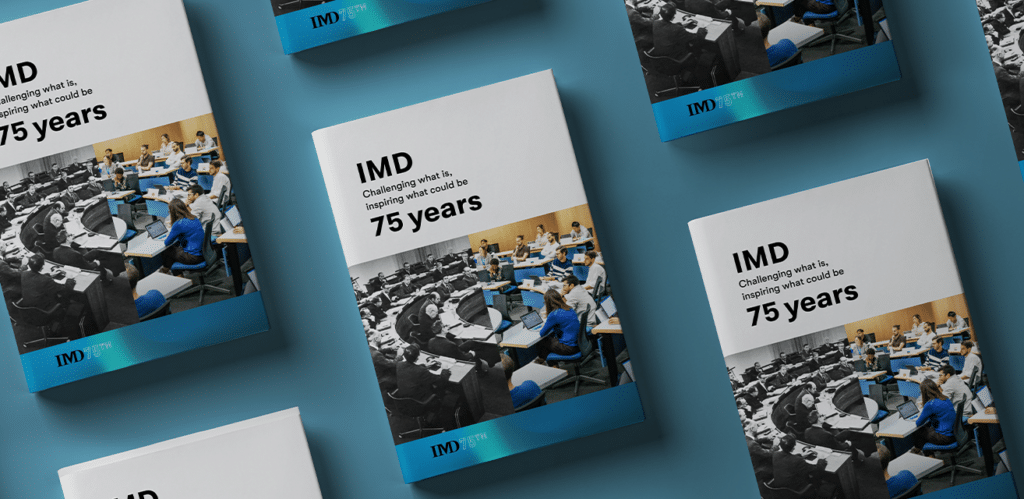
The book highlights the insights and ground-breaking accomplishments achieved during IMD’s rise to prominence as one of the world’s leading providers of executive education. It reveals the events and people that shaped the institute and in turn enabled it to develop and transform the success of thousands of leaders and organizations worldwide.
On these strong foundations, the final chapter looks forward, outlining the developments, initiatives and shifts in its programs and activities – IMD will continue to challenge what is and inspire what could be well into the future.
IMD 75 years is available as an eBook or Kindle edition.
If you require any further information please contact us at [email protected].

